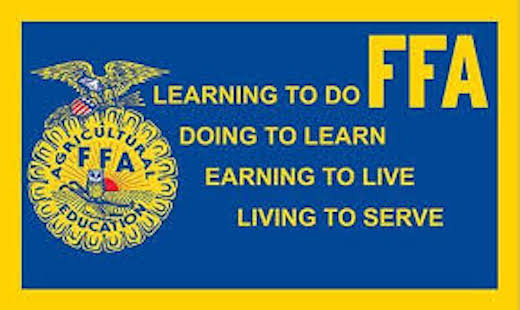How did FFA and Ag Education thrive during COVID and what challenges lie ahead were the topics of the October 7, 2021 virtual meeting of the Philadelphia Society for Promoting Agriculture with a panel entitled “Agricultural Education for Youth after COVID: A Quad-State Report”. PSPA hosted National FFA’s CEO and executives and student officers from PA, MD, NJ and DE FFA at the October Zoom meeting. Dedication, determination, resilience and resourcefulness resulted in an abundance of programming and engagement.
National FFA CEO Scott Stump spoke on COVID challenges, silver linings and FFA’s future. COVID caused profound disruption but FFA leaders creatively stepped out in new ways. On-line programs and virtual meetings increased accessibility…a ‘silver lining’. FFA’s virtual 2020 National Convention reached a record 217,000 participants. As a result, the 2021 Convention will be hybrid in-person/online at the end of this month. Looking ahead, FFA is committed to providing authentic, technologically relevant skills and learning experiences that provide the widest array of opportunities geared to the future (sustainability, robotics), not the past.
“Our 90 year old playbook was put on the shelf and we had to rewrite it” said Mike Brammer, PA FFA Executive Director. FFA and student officers created YouTube videos ranging from lesson plans for ag educators to FFA project tracking tools to the “Inside the Jacket” leadership development series for students. They found that virtual meetings and instruction can work well, and are developing a new strategic plan for this. Student Abbie O’Neill, PA FFA President, confirmed that online programs are great for connecting and accessibility. PAFFA is moving back to ‘in person’ events as much as possible, however – nothing can replace the social element of people getting together.
“If you build it, they will come”, according to Erin Noble, NJ State FFA Advisor. Since each school has its own rules, FFA realized that they needed to offer both synchronous and asynchronous and so “went virtual”. For student Jonathan Finney, NJ State FFA Treasurer, the goal is to have in-person events this year but also prioritize building social media engagement with members.
“We were at the FFA State Convention in March 2020 when COVID rolled in” said Amanda Powell, Delaware FFA Executive Secretary. National FFA rolled out online training for new State Officers and DE FFA started having Zoom meetings, then posting online career development events (CDEs) and then farmer/industry interviews on YouTube and social media. According to Kendall Metz, DE State FFA President, DE FFA is using social media to expand their presence with online and virtual programs. Students “are itching” to do things and FFA is filling that need with community service projects, online CDE and SAE highlights and virtual conferences.
“We were stopped in our tracks as to how we move forward” but then transformed to virtual; virtual workshops, conferences and conventions. Terrie Shank, Executive Director of MD FFA, said that virtual programming resulted in increased participation in all FFA workshops and events. Another positive…strong partnerships built with University of Maryland (online hosting and support of career development events) and MidAtlantic Farm Credit and Maryland Farm Bureau (community outreach). These kept students engaged and involved with local communities. Student Jayci Mitchell, MD State FFA President, described how MD FFA has opened up its social media engagement. Officers are producing virtual workshops and conducting virtual advocacy with legislators.
Learning by Doing grants fund an amazing variety of hands-on, agricultural and entrepreneurial student projects in Pennsylvania. The PA FFA Foundation awards grants to students for SAE (supervised agricultural experience) projects; to educators for training and equipment; and to FFA chapters for chapter projects. Sarah Sparks, Executive Director of the Foundation, spoke about highlights of the program. PSPA designated a donation to SAE grants because county fairs and animal sales were cancelled during COVID, leaving some students short of funds. Projects ranged from small animal ultrasound equipment to beef butchering and subsequent BBQ sales, to a student who raised ducks for meat and eggs.
Moderator Dr. Scott Sheely asked PSPA member on the call to share one or two words that they felt summarized the report. Words like flexibility, using more technology, partnerships, support for one another, and, finally, resilience where shared. Sheely reminded the PSPA members that support for agriculture education is one of pillars of the Strategic Plan of the Society.

